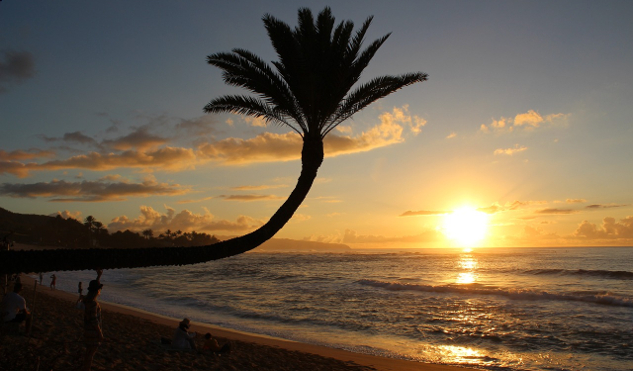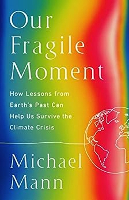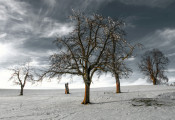
Image by Sean Baek
This event in Maui particularly touches Marie and me. We met in Hawaii some 25 years ago. We lived in Kauai and Oahu but have visited Lahaina. One of our authors, Will T. Wilkinson, and his wife also met in Hawaii and were residents of Maui. You can read Will's account here. Numerous other authors that have been featured on InnerSelf have lived on Maui: Wayne Dyer, Alan Cohen, Paul Pearsall, our previous astrology collaborator Eliza Bassett, and more.
As Maui's fires raged on, fueled by a combination of drought, intense winds, and climate shifts, the reality of our times became inescapably clear: we are living the climate crisis. A moment that vividly showcases the interconnectedness of nature's patterns, human intervention, and our survival. The recent fires in Hawaii have taken a tragic toll, claiming the lives of at least a hundred people and laying waste on numerous homes, businesses, and vast landscapes.
Anatomy of a Compound Climate Catastrophe
The tragedy unfolding in Maui is not a stand-alone incident. As Professor Michael Mann puts it, it's a compound climate catastrophe—a culmination of various elements. On the one hand, Hawaii is battling a severe drought, intensified by rising temperatures. Simultaneously, Hurricane Dora, a Category 4 storm, passed south of Hawaii, resulting in strong winds from its outer bands, further fanned the flames. While hurricanes are not new, the strength and intensity of recent hurricanes are undeniably connected to climate change.
The scene in Maui was akin to setting fire to a tinderbox. Dry conditions, exacerbated by climate change, provided ample fuel for the fire. Winds, strengthened by the pressure gradients of the nearby hurricane, acted as the perfect catalyst. The very mechanisms that make our planet beautiful – its interconnected atmospheric systems, the balances of pressure, and the forces of nature – also make it vulnerable when pushed out of equilibrium.
President Biden's Climate Stand
Amidst this backdrop, President Biden's comments on the climate crisis take center stage. While he might not have officially declared a 'climate emergency,' his actions speak of recognition and urgency. From rejoining the Paris Climate Accord to passing significant climate control initiatives, the administration signals its intent. But is it enough?
Declaring a national climate emergency isn't just about semantics. It's about mobilizing resources immediately. It's a statement that underscores the acute nature of the issue. But as Professor Mann points out, the climate crisis is a continually evolving challenge. Tackling it requires sustained effort, robust policies, and collective global will.
The very nature of the climate crisis demands an all-hands-on-deck approach. The limitation of a split Congress, a conservative court system, and political opposition make unilateral action challenging. It's here that the essence of democracy shines through. The people have a voice, and they must use it. As Mann advocates, the upcoming elections provide an opportunity. The urgency is apparent: elect leaders who prioritize the climate crisis and are committed to holistic, forward-thinking solutions.
A Needed and Essential Response
I much favor a WWII emergency-type response to our worldwide climate crisis as I believe it is the only way we can come close to adapting and mitigating the human suffering that awaits us. During World War II, nations underwent significant transformations: economies were rapidly retooled, resources were mobilized at an unprecedented scale, and global alliances were formed to combat a shared adversary. The same concept needs to be applied to tackle the climate crisis emphasizing the magnitude of unified effort, urgency, and global collaboration.
Such an approach to the climate crisis would mean swift global policy shifts toward sustainability, industries pivoting from fossil fuels to renewable energy, and nations pooling resources and knowledge. It underscores a reimagining of energy production or policy and a comprehensive societal transformation where the planet's well-being is prioritized above all else. This holistic, all-hands-on-deck strategy emphasizes adaptation to the changing climate and proactive measures to mitigate further damage and ensure a viable future for subsequent generations.
Our Fragile Moment: A Beacon of Hope?
The following video is an interview with Dr. Michael Mann concerning the Maui catastrophe. While the present paints a bleak picture, the future holds potential. Professor Mann's book, "Our Fragile Moment: How Lessons from Earth's Past Can Help Us Survive the Climate Crisis," sheds light on the way forward. Gleaning insights from our planet's history can provide a roadmap for a sustainable, harmonious future.
As the fires of Maui serve as a grim reminder, they also ignite a flame of hope and action. It's a clarion call for humans globally to understand, empathize, and act. The fate of our planet, quite literally, hangs in the balance. Dr. Mann calls for a massive turnout in the next election, and I wholeheartedly endorse that. Not only must the climate-denying Republicans be turned away, but Democrats and any remaining climate-crisis-acknowledging Republicans must be elected in masse. All hands on deck!
Related Book: Our Fragile Moment
Our Fragile Moment: How Lessons from Earth's Past Can Help Us Survive the Climate Crisis
by Michael E. Mann
 In this sweeping work of science and history, the renowned climate scientist and author of The New Climate War shows us the conditions on Earth that allowed humans not only to exist but thrive, and how they are imperiled if we veer off course. The conditions that allowed humans to live on this earth are fragile, incredibly so. But there’s a relatively narrow envelope of climate variability within which human civilization remains viable. And our survival depends on conditions remaining within that range.
In this sweeping work of science and history, the renowned climate scientist and author of The New Climate War shows us the conditions on Earth that allowed humans not only to exist but thrive, and how they are imperiled if we veer off course. The conditions that allowed humans to live on this earth are fragile, incredibly so. But there’s a relatively narrow envelope of climate variability within which human civilization remains viable. And our survival depends on conditions remaining within that range.
In this book, Michael Mann arms readers with the knowledge necessary to appreciate the gravity of the unfolding climate crisis, while emboldening them—and others--to act before it truly does become too late.
For more info and/or to order this book, click here. Also available in an Audiobook format, Kindle edition, and Audio CD.
About the Author
 Robert Jennings is the co-publisher of InnerSelf.com, a platform dedicated to empowering individuals and fostering a more connected, equitable world. A veteran of the U.S. Marine Corps and the U.S. Army, Robert draws on his diverse life experiences, from working in real estate and construction to building InnerSelf with his wife, Marie T. Russell, to bring a practical, grounded perspective to life’s challenges. Founded in 1996, InnerSelf.com shares insights to help people make informed, meaningful choices for themselves and the planet. More than 30 years later, InnerSelf continues to inspire clarity and empowerment.
Robert Jennings is the co-publisher of InnerSelf.com, a platform dedicated to empowering individuals and fostering a more connected, equitable world. A veteran of the U.S. Marine Corps and the U.S. Army, Robert draws on his diverse life experiences, from working in real estate and construction to building InnerSelf with his wife, Marie T. Russell, to bring a practical, grounded perspective to life’s challenges. Founded in 1996, InnerSelf.com shares insights to help people make informed, meaningful choices for themselves and the planet. More than 30 years later, InnerSelf continues to inspire clarity and empowerment.
Creative Commons 4.0
This article is licensed under a Creative Commons Attribution-Share Alike 4.0 License. Attribute the author Robert Jennings, InnerSelf.com. Link back to the article This article originally appeared on InnerSelf.com
Recommended Books:
Yellowstone's Wildlife in Transition
 Over thirty experts detect worrying signs of a system under strain. They identify three overriding stressors: invasive species, private-sector development of unprotected lands, and a warming climate. Their concluding recommendations will shape the twenty-first-century discussion over how to confront these challenges, not only in American parks but for conservation areas worldwide. Highly readable and fully illustrated.
Over thirty experts detect worrying signs of a system under strain. They identify three overriding stressors: invasive species, private-sector development of unprotected lands, and a warming climate. Their concluding recommendations will shape the twenty-first-century discussion over how to confront these challenges, not only in American parks but for conservation areas worldwide. Highly readable and fully illustrated.
For more info or to order "Yellowstone's Wildlife in Transition" on Amazon.
The Energy Glut: Climate Change and the Politics of Fatness
 by Ian Roberts. Expertly tells the story of energy in society, and places 'fatness' next to climate change as manifestations of the same fundamental planetary malaise. This exciting book argues that the pulse of fossil fuel energy not only started the process of catastrophic climate change, but also propelled the average human weight distribution upwards. It offers and appraises for the reader a set of personal and political de-carbonising strategies.
by Ian Roberts. Expertly tells the story of energy in society, and places 'fatness' next to climate change as manifestations of the same fundamental planetary malaise. This exciting book argues that the pulse of fossil fuel energy not only started the process of catastrophic climate change, but also propelled the average human weight distribution upwards. It offers and appraises for the reader a set of personal and political de-carbonising strategies.
For more info or to order "The Energy Glut" on Amazon.
Last Stand: Ted Turner's Quest to Save a Troubled Planet
 by Todd Wilkinson and Ted Turner. Entrepreneur and media mogul Ted Turner calls global warming the most dire threat facing humanity, and says that the tycoons of the future will be minted in the development of green, alternative renewable energy. Through Ted Turner's eyes, we consider another way of thinking about the environment, our obligations to help others in need, and the grave challenges threatening the survival of civilization.
by Todd Wilkinson and Ted Turner. Entrepreneur and media mogul Ted Turner calls global warming the most dire threat facing humanity, and says that the tycoons of the future will be minted in the development of green, alternative renewable energy. Through Ted Turner's eyes, we consider another way of thinking about the environment, our obligations to help others in need, and the grave challenges threatening the survival of civilization.
For more info or to order "Last Stand: Ted Turner's Quest..." on Amazon.



